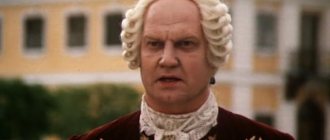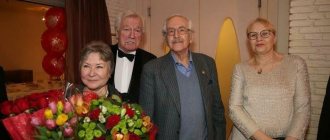| Valery Barinov | |
| Birth name: | Valery Alexandrovich Barinov |
| Place of Birth: | village Zhilino, Volodarsky district, Oryol region, RSFSR, USSR |
| Profession: | actor |
| Career: | 1973 - present time |
| Awards: | |
Wikipedia has articles about other people with the surname Barinov.
Valery Aleksandrovich Barinov
(born January 15, 1946, village of Zhilino, Oryol region) - Soviet and Russian theater and film actor, People's Artist of the Russian Federation (1999)[1][2].
Biography
Valery Barinov was born on January 15, 1946 in the village of Zhilino, Volodarsky district (now Oryol district), Oryol region. After graduating from the M. S. Shchepkin Higher Theater School in 1968, he began working at the theater. A. S. Pushkin in Leningrad (now the Alexandrinsky Theater). Until 1974 he played on the Leningrad stage.
He worked with director Rostislav Goryaev, went to Moscow with him, and from 1974 to 1988 was a member of the troupe of the Central Theater of the Soviet Army (now the Theater of the Russian Army), which in those years was headed by Rostislav Goryaev. In 1988-1991 he was an actor at the Pushkin Theater in Moscow. In 1992 he joined the Maly Theater troupe. Since 2005 - actor at the Moscow Youth Theater.
He is a fan of the Lokomotiv football club.
Egor Barinov now
In 2020, Egor Barinov played the role of Shtyr in the detective series “Metro Police Captain” about a mysterious crime that occurred in the Moscow metro.
Egor Barinov
In 2020, two more films with the participation of Yegor Barinov were released. The crime film "The Fugitive" tells the story of a professional swindler who scammed his own boss out of money and fled to his hometown, where he accidentally got a job with the police. In this film, the authors also decided to use Barinov’s resemblance to Quentin Tarantino. In the crime drama, the actor plays a man with this nickname.
Also in 2020, Yegor Barinov appeared in the social drama “Vera.” The film tells about the life of the Old Believers and the events that took place in 1948 in an Old Believer village in the Chita region. The idea of the film is dedicated to both the social upheavals of this period and the spiritual quest of the heroes.
Creation
... Barinov said in an interview that he starred in one hundred and thirty roles - he doesn’t remember what he really is like
— Alexander Nilin Peredelkino station: over fences: a novel of private life. Moscow: AST: Edited by Elena Shubina, 2020 ISBN 978-5-17-087072-1
Roles in the theater
Maly Theater
- 1995 - “Tsar Ivan the Terrible” by Alexei Tolstoy - Zakharyin-Yuryev
- 1998 - “Mad Money” by Alexander Ostrovsky - Kuchumov
- 1998 - “Labor Bread” by Alexander Ostrovsky - Korpelov
- 1998 - “Cunning and Love” by Friedrich Schiller - President
- 2001 - “The Deep” by Alexander Ostrovsky - Borovtsov
- 2002 - “Corsican Woman” I. Gubach - Napoleon
MTYUZ
- "Rothschild's Violin" - Yakov
- “The Black Monk” (E. Pesotsky), dir. Kama Ginkas
- "Shakespeare's Fools" - The Duke, aka Prospero, aka Gloucester
- Lady Macbeth of our district - Boris Timofeevich
Film Actor Theater
- “Corsican Woman” I. Gubach
Film roles
- 1969 - Steps on the ground
- 1973 - Touch
- 1976 - The Strogoffs - Vlas Strogoff
- 1978 - Glass beads - Samartsev
- 1979 - Matchmaking of a hussar - hussar
- 1981 - Two lines in small print - Deryabin, security department agent
- 1981 - Spring - Dronov
- 1982 - Red Bells. Film 2. I saw the birth of a new world - Nikolai Ilyich Podvoisky
- 1983 - Mistress of the orphanage - Boris Maksimov
- 1984 - Who is stronger than him
- 1984 - Mister Veliky Novgorod - Teutonic Knight
- 1985 - Five minutes of fear - Evgeny Ivanovich Zhogin, a former criminal helping police officers
- 1985 - Cherry Whirlpool - Mikhail Kharlamov
- 1985 - Battle for Moscow - Nikolai Alexandrovich
- 1986 - Attempt on GOELRO - Nikolai Egorov, railway station duty officer
- 1986 - First guy
- 1987 - Lucky - Grigory Petrovich, coach
- 1987 - We are your children
- 1987 — Article
- 1987 - Under the sign of the Red Cross - Eduard Kartashov
- 1987 - It’s not always summer in Crimea - Yuri Gaven
- 1987 - Assassination - Fedya
- 1988 - Aborigine - Felix
- 1988 - And the light shines in the darkness
- 1988 - Forgive us, garden...
- 1988 - In a familiar street... - Petrov
- 1989 - Prince Luck Andreevich - Shilnikov
- 1989 - Eve (film)
- 1990 - In the surf - “Cat” Borodulin
- 1990 - Nautilus
- 1990 - Lessons at the end of spring
- 1991 - Wolfhound - Korneev
- 1991 - Game for Millions - Captain
- 1991 - Clan
- 1991 - Case of Sukhovo-Kobylin - investigator
- 1992 - Crazy Love
- 1992 - Shamil. Paradise under the shadow of sabers - general
- 1992 - Silence - Bykov
- 1993 - Territory
- 1993 - The Emperor's Romance
- 1994 - St. Petersburg secrets - Polievkt Kharlampievich Khlebonasushchensky
- 1994 - Round trip ticket
- 1995 - House on the Rock
- 1995 - Principled and compassionate look - groom
- 1996 - Agape - Savva Timofeevich Berkutov
- 1997 - Possessed
- 1998 - At Knives - Perushkin / Voroshilov, police agent
- 1998 - Classic - owner of the mansion
- 1998 - Reflection
- 1998 - Siberian Spas
- 1998 - The denouement of the St. Petersburg mysteries - Polievkt Kharlampievich Khlebonasushchensky
- 1999 - D.D.D. File of detective Dubrovsky - “Engraver”, leader of a gang of counterfeiters
- 1999—2003 — Simple truths
- 2000 - March of Turetsky (4 episode “Killer Syndicate”) - Vladimir Ivanovich Molchanov, general director of the concern
- 2000 - Empire under attack (series “Abel and Cain” and “Grand Duchess”) - Leonid Aleksandrovich Rotaev
- 2000 - House for the rich
- 2000 - There is no third option
- 2000-2001 - Trace of the werewolf (Ukrainian) Russian. — Alexander Grigorievich Akinfeev
- 2001 - Men's work - Pavel Shakhov, member of the government
- 2001 - Don’t leave me, love - Glazyrin
- 2002 - Breed - Anna's father
- 2002 - Heir - Mikhail Andreevich, curator
- 2002 - Kamenskaya (series “Men’s Games”) - Stoyanov
- 2002 - Mask and soul
- 2002 - Men's work 2 - Pavel Shakhov, member of the government
- 2002-2004 - Shukshinsky stories (series “Withers - disappears”) - Vladimir Nikolaevich (Uncle Volodya)
- 2003 - Bayazet - manager
- 2003 - March of Turetsky (series “Bloody Leave”) - Colonel Zuev
- 2003 - Best city on earth - coach
- 2003 - Evlampia Romanova. The investigation is being conducted by an amateur
- 2003 - Next 3 - Boris Antonovich Khomchenko
- 2003 - I planned an escape - first secretary of the district committee
- 2003 - Striped Summer
- 2003 - Abyss - Borovtsov
- 2004 - Driver for Vera - Klimenko, general
- 2004 - Moscow smiles[3]
- 2004 - Saboteur - general
- 2004 - Sins of the Fathers - Grigory Androsov
- 2004 - Russian - Arkhipov, professor
- 2004 - Chess player - Udovenko
- 2004 - Silver Lily of the Valley 2 (episode “Therapist’s Love”) - Teterin
- 2004 - My Prechistenka - Sokolov
- 2004 - Detectives 3 (episode "Dead Man's Long Night") - Panoramov
- 2005 - Rope of Sand - “Beard”
- 2005 - One of our own - Lev Filippovich, father-in-law of Sergei Morozov
- 2005 - Nine unknowns - Andrei Yakovlevich Radugin, Grand Commander of the Main College of the Order of the Cross and Rose
- 2006 - Andersen. Life without love - undertaker
- 2006 - Lonely Sky - Zakharych
- 2006 - Park of the Soviet period - Burda, general
- 2006 - Goddess of Prime Time - Viktor Petrovich
- 2006 - Secret assignments
- 2006 - Game of Shindai - Oleg Vasilievich
- 2006 - Nanny needed - Anatoly Petrovich
- 2006 - Ticket to the harem
- 2006 - Loneliness of love - Fyodor Arnoldovich Prado
- 2006 - Mad Money - Grigory Kuchumov
- 2006-2007 - Cadets - Alexander Mikhailovich Nozdryov, colonel, head of the educational department
- 2007 - Reluctant Millionaire - Maxim Yegorych
- 2007 - Election Day - Ivan Andreevich Burdun, Lieutenant General
- 2007 - Nothing personal - Zimin
- 2007 - Scarves - Ikonnikov
- 2007 - The best film - Sergei Viktorovich, banker, Nastya’s father
- 2007 - Vanechka - taxi driver
- 2007 - Mad - Olkhovsky
- 2007 - Toy Soldier Games
- 2007 - Irony of fate. Continuation
- 2007 - Urgently to the room (series “Voodoo Mark”) - Reason, Svetlana’s father
- 2008 - Contract for love - Valery Alexandrovich
- 2008 - traffic police, etc. — Kalinin, general
- 2008 - Alias "Albanian"-2 - Alexander Mikhailovich
- 2008 - Girl - Toma's father
- 2008 - Just come back! — Peter, Julia's father
- 2008 - Crisis of Faith - Burtsev
- 2008 - Two sisters
- 2008 - Chain - Gennady Naumovich Frolov
- 2008-2010 - Ranetki - Savchenko, school director
- 2009 - Games for adults - operative
- 2009 - Bigwigs. To be together - Igor Sergeevich Shushenin
- 2009 - Kromov - Meshcherin, ambassador
- 2009-2010 - What should the heart do - Pyotr Ivanov, Anna’s father
- 2009 - Concert - Ivan Gavrilov
- 2009 - The Path - Lieutenant General
- 2009 - The hell with it
- 2009 - To the touch - Gleb’s grandfather
- 2009-2011 - Clouds over the hills (Japan) - Sergey Yulievich Witte
- 2010 - I’m going out to look for you - Evgeny Borisovich Gavrilov
- 2010 - Soldiers 16. Dembel is inevitable - Vasiliev, Major General
- 2010 - Angelica - Sergei Mikhailovich Goltsov
- 2010 - A hedgehog came out of the fog
- 2010 - Mother's Heart - Afanasyev, Colonel
- 2010 - Alias "Albanian" 3 - Alexander Mikhailovich
- 2010—2011 — Institute of Noble Maidens
- 2011 - Furtseva - Georgy Konstantinovich Zhukov
- 2011 - Last meeting - Igor
- 2011 - Bombed
- 2011 - News - Mark Borisovich Starodubtsev, general director and co-owner of the TST channel
- 2011 - Ranetki. Final chord - Nikolai Pavlovich Savchenko (“Shrek”), school director, physics teacher
- 2011 - Counterplay - Filin, GRU general
- 2011 - House of the Wind - Vsevolod Stepanovich, head physician of the clinic
- 2011 — A riddle for Vera
- 2011 - Men's women's game - Ivan Vasilievich Furtsev, coach
- 2012 - I’m going out to look for you 2
- 2012 - Shapovalov - Vitaly Mikhailovich Makhorkin, Colonel of the Ministry of Internal Affairs
- 2012 - Angel in the heart - Grigory Dmitrievich, Dmitry’s father
- 2012 - Every man for himself - Nazar
- 2012 - Beauty - “Boss” / Batyrov
- 2012 - Poor relatives - Sizov
- 2012 - Fedorov
- 2013 - Smart guy
- 2013 - Teachers
- 2013 - About football - Teacher's father
- 2014 - Where does the Motherland begin - Vladimir Aleksandrovich Struchkov, Chief, Head of the PGU KGB of the USSR
- 2014 - Light and shadow of the lighthouse - Krotov
- 2014 - Professional - Arseny Ivanovich Didyun, retired FSB general
- 2015 - Glory - Anatoly Tarasov
- 2015 - Red Queen
- 2016 - “In the constellation Sagittarius” - Nikita Sergeevich Khrushchev
Cartoon dubbing
- 1998 - Dunno on the Moon - Migl
Movies
Yegor Barinov first appeared in a movie when he was five years old. It was the film “The Cherry Whirlpool” directed by Leonid Golovny. In 1990, he starred in the film Nautilus. The actor did not act in film for the next six years. In 1996, he appeared in the film "Agate", where he played with his father. And again a series of episodic roles followed.
Egor Barinov in the TV series “Turkish March”
Yegor Valerievich more than once doubted the correctness of his choice and even reproached his father for not dissuading him. Barinov Sr. then wisely noted that the time had not come yet, closer to 40 years old it would come, we had to wait.
Egor Barinov often stars in TV series, including “Turkish March”, “Kadetstvo”, “District Detectives”, “Daddy’s Daughters”, “Maryina Roshcha”, “Two Sisters”, “Margosha” and many others.
The actor considers the film “Nanjing Landscape”, shot by Valery Rubinchik in 2006, one of his best works. In this melodrama, Barinov played, as he himself says, “a bald criminal with a scar and a hair fix.” His character is a killer who takes the life of the main character. But the actor says that the fate of his hero involuntarily evokes sympathy, he is worthy of compassion. For Yegor, this work became an experiment. Calm and balanced in life, he reincarnated as the complete opposite of himself, living part of another person’s life.
Egor Barinov in the film “Nanjing Landscape”
Later, he often had to transform himself into a daring criminal, a charming scoundrel, and a principled investigator. But more often directors see him in the role of a negative hero. A tall (the actor is 193 cm tall) man with sharp but harmonious facial features regularly seemed suitable for the roles of anti-heroes. The role of Mitya in “The Weaknesses of a Strong Woman” is one of the few where Barinov’s hero is positive.
In recent years, Yegor Barinov has played leading roles in the films “Russian Character”, “The Other Shore”, “Paternal Instinct”, “Love in a Million”, etc. In the actor’s creative biography, the number of films and TV series is approaching 150.
Egor Barinov and Quentin Tarantino
Fans believe that Yegor Barinov is phenomenally similar to the cult Hollywood director and actor Quentin Tarantino. And if in the case of theories about the similarities of other stars, such searches for similar actors remain a source of entertainment for fans, then the similarities between Yegor Barinov and Tarantino were also noticed by directors. In 2006, the actor played the role of Quentin Tarantino in the youth crime comedy Take Tarantino. The film tells about a wedding in Kalmykia, for which the gift from the groom's father should be a new Tarantino film, which has not yet been released. To get the painting, messengers with a bag of diamonds go to America.
In 2011, Egor graduated from directors' courses. Egor Barinov defended his diploma with the help of a short film “Impact”, which was shot without words. The short film is shot in the tragicomedy genre and shows how society is overloaded with aggression. In 2020, Barinov’s film received the main prize at the Independent Film Festival in St. Petersburg. Perhaps, in the foreseeable future, viewers will see full-length films shot by him.
Egor Barinov in the series “Fizruk”
In 2014, Egor Barinov received a role in the popular comedy series “Fizruk”
with Dmitry Nagiyev in the title role. The actor played the minor role of Ronin, the head of Belova's security service, but appeared in this role in all seasons of the series.
Notes
- [document.kremlin.ru/doc.asp?ID=060552 Decree of the President of the Russian Federation of April 18, 1999 No. 502]
- Russian Drama Theatre: Encyclopedia / Ed. ed. M. I. Andreeva, N. E. Zvenigorodskaya, A. V. Martynova and others - M.: Great Russian Encyclopedia, 2001. - 568 pp.: ill. ISBN 5-85270-167-X
- [www.kinomania.ru/film/465552/], mini-series based on the script by A. Trushkin (2008) ([smotri-filmu.ru/4944-moskva-ulybaetsya-2008-serial-3-serii-rossiya-satrip. html video])
- [tv.mk.ru/video/2013/04/21/kak-akter-valeriy-barinov-pobedil-stophamov.html How actor Valery Barinov defeated “StopHam”]
- [www.mk.ru/moscow/2013/04/21/844860-akter-valeriy-barinov-o-dorozhnom-skandale-quotdobro-s-kulakami-strashnee-chem-zloquot.html Actor Valeriy Barinov - about the road scandal: “Good with fists is more terrible than evil”]
- [www.pravoteka.ru/pst/1040/519570.html Decree of the President of the Russian Federation of March 11, 2006 No. 198]
Links
Wikiquote has a page on the topic Barinov, Valery Alexandrovich
- [www.ruskino.ru/art/218 Valery Barinov on ruskino.ru]
- [rusakters.ru/barinov-valeriy.html Valery Barinov at rusakters.ru]
- [www.moscowtyz.ru/pers.php?id=61 Barinov Valery]
| : Incorrect or missing image | To improve this article it is desirable:
|
Personal life
Egor Barinov first married in his youth. His chosen one was actress Elena Novikova. However, after 2 years of married life, the couple realized that they were not suitable for each other. As a result, they decided to separate.
An interesting fact is that during the divorce, Elena found out that she was pregnant. However, the couple still divorced. The born boy remained to live with his mother.
Barinov's second wife was an actress named Ksenia.
Egor Barinov with his wife Ksenia and daughters
Their romance lasted for 4 years, after which the girl gave her lover an ultimatum: either marriage or separation.
At that moment, Yegor did not really want to part with his single life. However, when he realized that Ksenia was not joking, he decided to propose to her.
According to the actor, he is happy that he has such a loving and faithful wife. In this marriage they had three girls: Polina, Anastasia and Maria.
Excerpt characterizing Barinov, Valery Alexandrovich
- Whom do you want, mamzel? He said, narrowing his eyes and smiling. Natasha calmly repeated her question, and her face and whole manner, despite the fact that she continued to hold her handkerchief by the ends, were so serious that the major stopped smiling and, at first thinking, as if asking himself to what extent this was possible, answered her in the affirmative. “Oh, yes, why, it’s possible,” he said. Natasha slightly bowed her head and quickly walked back to Mavra Kuzminishna, who was standing over the officer and talking to him with pitiful sympathy. - It’s possible, he said, it’s possible! – Natasha said in a whisper. An officer in a wagon turned into the Rostovs' yard, and dozens of carts with the wounded began, at the invitation of city residents, to turn into the courtyards and drive up to the entrances of the houses on Povarskaya Street. Natasha apparently benefited from these relationships with new people, outside the usual conditions of life. She, together with Mavra Kuzminishna, tried to bring as many wounded as possible into her yard. “We still need to report to dad,” said Mavra Kuzminishna. - Nothing, nothing, doesn’t it matter! For one day we will move to the living room. We can give them all our half. - Well, you, young lady, will come up with it! Yes, even to the outbuilding, to the bachelor, to the nanny, and then you need to ask. - Well, I'll ask. Natasha ran into the house and tiptoed through the half-open door of the sofa, from which there was a smell of vinegar and Hoffmann's drops. -Are you sleeping, mom? - Oh, what a dream! - said the countess, who had just dozed off, waking up. “Mom, darling,” said Natasha, kneeling in front of her mother and putting her face close to hers. “I’m sorry, I’m sorry, I never will, I woke you up.” Mavra Kuzminishna sent me, they brought the wounded here, officers, if you please? And they have nowhere to go; I know that you will allow...” she said quickly, without taking a breath. - Which officers? Who did they bring? “I don’t understand anything,” said the Countess. Natasha laughed, the Countess also smiled faintly. – I knew that you would allow... so I’ll say so. - And Natasha, kissing her mother, got up and went to the door. In the hall she met her father, who had returned home with bad news. - We've finished it! – the count said with involuntary annoyance. – And the club is closed, and the police come out. - Dad, is it okay that I invited the wounded into the house? – Natasha told him. “Of course, nothing,” the count said absently. “That’s not the point, but now I ask you not to worry about trifles, but to help pack and go, go, go tomorrow...” And the count conveyed the same order to the butler and the people. During dinner, Petya returned and told him his news. He said that today the people were dismantling weapons in the Kremlin, that although Rostopchin’s poster said that he would shout the cry in two days, but that an order had probably been made that tomorrow all the people would go to the Three Mountains with weapons, and what was there there will be a big battle. The countess looked with timid horror at the cheerful, heated face of her son while he said this. She knew that if she said the word that she was asking Petya not to go to this battle (she knew that he was rejoicing at this upcoming battle), then he would say something about men, about honor, about the fatherland - something like that senseless, masculine, stubborn, which cannot be objected to, and the matter will be ruined, and therefore, hoping to arrange it so that she could leave before that and take Petya with her as a protector and patron, she did not say anything to Petya, and after dinner she called the count and with tears she begged him to take her away as soon as possible, that same night, if possible. With a feminine, involuntary cunning of love, she, who had hitherto shown complete fearlessness, said that she would die of fear if they did not leave that night. She, without pretending, was now afraid of everything. M me Schoss, who went to see her daughter, further increased the Countess’s fear with stories of what she saw on Myasnitskaya Street in the drinking establishment. Returning along the street, she could not get home from the drunken crowd of people raging near the office. She took a cab and drove around the lane home; and the driver told her that people were breaking barrels in the drinking establishment, which was so ordered. After dinner, everyone in the Rostov family set about packing their things and preparing for departure with enthusiastic haste. The old count, suddenly getting down to business, continued walking from the yard to the house and back after dinner, stupidly shouting at the hurrying people and hurrying them even more. Petya gave orders in the yard. Sonya did not know what to do under the influence of the count’s contradictory orders, and was completely at a loss. People ran around the rooms and courtyard, shouting, arguing and making noise. Natasha, with her characteristic passion in everything, suddenly also got down to business. At first, her intervention in the bedtime business was met with disbelief. Everyone expected a joke from her and did not want to listen to her; but she persistently and passionately demanded obedience, became angry, almost cried that they did not listen to her, and finally achieved that they believed in her. Her first feat, which cost her enormous effort and gave her power, was laying carpets. The count had expensive gobelins and Persian carpets in his house. When Natasha got down to business, there were two open drawers in the hall: one almost filled to the top with porcelain, the other with carpets. There was still a lot of porcelain laid out on the tables and everything was still being brought from the pantry. It was necessary to start a new, third box, and people followed it. “Sonya, wait, we’ll arrange everything like this,” Natasha said. “You can’t, young lady, we already tried,” said the barmaid. - No, wait, please. – And Natasha began to take out dishes and plates wrapped in paper from the drawer. “The dishes should be here, in the carpets,” she said. “And God forbid that the carpets be spread out into three boxes,” said the barman. - Yes, wait, please. – And Natasha quickly, deftly began to take it apart. “It’s not necessary,” she said about Kyiv plates, “yes, it’s for carpets,” she said about Saxon dishes. - Leave it alone, Natasha; “Okay, that’s enough, we’ll put him to bed,” Sonya said reproachfully. - Eh, young lady! - said the butler. But Natasha didn’t give up, threw out all the things and quickly started packing again, deciding that there was no need to take the bad home carpets and extra dishes at all. When everything was taken out, they began to put it away again. And indeed, having thrown out almost everything cheap, what was not worth taking with us, everything valuable was put into two boxes. Only the lid of the carpet box did not close. It was possible to take out a few things, but Natasha wanted to insist on her own. She stacked, rearranged, pressed, forced the barman and Petya, whom she carried along with her into the work of packing, to press the lid and made desperate efforts herself. “Come on, Natasha,” Sonya told her. “I see you’re right, but take out the top one.” “I don’t want to,” Natasha shouted, holding her loose hair over her sweaty face with one hand and pressing the carpets with the other. - Yes, press, Petka, press! Vasilich, press! - she shouted. The carpets pressed and the lid closed. Natasha, clapping her hands, squealed with joy, and tears flowed from her eyes. But it only lasted for a second. She immediately set to work on another matter, and they completely believed her, and the count was not angry when they told him that Natalya Ilyinishna had canceled his order, and the servants came to Natasha to ask: should the cart be tied up or not and is it sufficiently imposed? The matter progressed thanks to Natasha’s orders: unnecessary things were left behind and the most expensive ones were packed in the closest possible way. But no matter how hard all the people worked, by late night not everything could be packed. The Countess fell asleep, and the Count, postponing his departure until the morning, went to bed. Sonya and Natasha slept without undressing in the sofa room. That night, another wounded man was transported through Povarskaya, and Mavra Kuzminishna, who was standing at the gate, turned him towards the Rostovs. This wounded man, according to Mavra Kuzminishna, was a very significant person. He was carried in a carriage, completely covered with an apron and with the top down. An old man, a venerable valet, sat on the box with the cab driver. A doctor and two soldiers were riding in the cart behind. - Come to us, please. The gentlemen are leaving, the whole house is empty,” said the old woman, turning to the old servant. “Well,” answered the valet, sighing, “and we can’t get you there with tea!” We have our own house in Moscow, but it’s far away, and no one lives. “You are welcome to us, our gentlemen have a lot of everything, please,” said Mavra Kuzminishna. - Are you very unwell? – she added. The valet waved his hand. - Don’t bring tea! You need to ask the doctor. - And the valet got off the box and approached the cart. “Okay,” said the doctor. The valet went up to the carriage again, looked into it, shook his head, ordered the coachman to turn into the yard and stopped next to Mavra Kuzminishna. - Lord Jesus Christ! - she said. Mavra Kuzminishna offered to carry the wounded man into the house. “The gentlemen won’t say anything...” she said. But it was necessary to avoid climbing the stairs, and therefore the wounded man was carried into the outbuilding and laid in the former room of m me Schoss. The wounded man was Prince Andrei Bolkonsky. The last day of Moscow has arrived. It was clear, cheerful autumn weather. It was Sunday. As on ordinary Sundays, mass was announced in all churches. No one, it seemed, could yet understand what awaited Moscow. Only two indicators of the state of society expressed the situation in which Moscow was: the mob, that is, the class of poor people, and the prices of objects. Factory workers, courtyard workers and peasants in a huge crowd, which included officials, seminarians, and nobles, went out to the Three Mountains early in the morning. Having stood there and not waiting for Rostopchin and making sure that Moscow would be surrendered, this crowd scattered throughout Moscow, into drinking houses and taverns. Prices that day also indicated the state of affairs. The prices for weapons, for gold, for carts and horses kept rising, and the prices for pieces of paper and for city things kept going down, so that in the middle of the day there were cases when the cabbies took out expensive goods, like cloth, for nothing, and for a peasant's horse paid five hundred rubles; furniture, mirrors, bronzes were given away for free. In the sedate and old Rostov house, the disintegration of previous living conditions was expressed very weakly. The only thing about people was that three people from a huge courtyard disappeared that night; but nothing was stolen; and in relation to the prices of things, it turned out that the thirty carts that came from the villages were enormous wealth, which many envied and for which the Rostovs were offered huge amounts of money. Not only were they offering huge sums of money for these carts, but from the evening and early morning of September 1st, orderlies and servants sent from the wounded officers came to the Rostovs’ yard, and the wounded themselves, who were placed with the Rostovs and in neighboring houses, were dragged along, and begged the Rostovs’ people to take care of that they be given carts to leave Moscow. The butler, to whom such requests were addressed, although he felt sorry for the wounded, resolutely refused, saying that he would not even dare to report this to the count. No matter how pitiful the remaining wounded were, it was obvious that if they gave up one cart, there was no reason not to give up the other, and give up everything and their crews. Thirty carts could not save all the wounded, and in the general disaster it was impossible not to think about yourself and your family. This is what the butler thought for his master. Waking up on the morning of the 1st, Count Ilya Andreich quietly left the bedroom so as not to wake up the countess who had just fallen asleep in the morning, and in his purple silk robe he went out onto the porch. The carts, tied up, stood in the yard. Carriages stood at the porch. The butler stood at the entrance, talking with the old orderly and the young, pale officer with his arm tied. The butler, seeing the count, made a significant and stern sign to the officer and orderly to leave. - Well, is everything ready, Vasilich? - said the count, rubbing his bald head and looking good-naturedly at the officer and orderly and nodding his head to them. (The Count loved new faces.) - At least harness it now, Your Excellency. - Well, that’s great, the countess will wake up, and God bless you! What are you doing, gentlemen? – he turned to the officer. - In my house? – The officer moved closer. His pale face suddenly flushed with bright color. - Count, do me a favor, let me... for God's sake... take refuge somewhere on your carts. Here I have nothing with me... I’m in the cart... it doesn’t matter... - Before the officer had time to finish, the orderly turned to the count with the same request for his master. - A! “Yes, yes, yes,” the count spoke hastily. - I'm very, very happy. Vasilich, you give orders, well, to clear one or two carts, well... well... what is needed... - the count said in some vague expressions, ordering something. But at the same moment, the officer’s ardent expression of gratitude already cemented what he had ordered. The count looked around him: in the courtyard, at the gate, in the window of the outbuilding, the wounded and orderlies could be seen. They all looked at the count and moved towards the porch. - Please, your Excellency, to the gallery: what do you order about the paintings? - said the butler. And the count entered the house with him, repeating his order not to refuse the wounded who asked to go. “Well, well, we can put something together,” he added in a quiet, mysterious voice, as if afraid that someone would hear him. At nine o'clock the countess woke up, and Matryona Timofeevna, her former maid, who served as chief of gendarmes in relation to the countess, came to report to her former young lady that Marya Karlovna was very offended and that the young ladies' summer dresses could not stay here. When the countess questioned why m me Schoss was offended, it was revealed that her chest had been removed from the cart and all the carts were being untied - they were removing the goods and taking with them the wounded, whom the count, in his simplicity, ordered to be taken with him. The Countess ordered to ask for her husband. – What is it, my friend, I hear things are being removed again? - You know, ma chere, I wanted to tell you this... ma chere countess... an officer came to me, asking me to give several carts for the wounded. After all, this is all a gainful business; But think about what it’s like for them to stay!.. Really, in our yard, we invited them ourselves, there are officers here. You know, I think, right, ma chere, here, ma chere... let them take them... what's the rush?.. - The Count timidly said this, as he always said when it came to money. The Countess was already accustomed to this tone, which always preceded a task that ruined the children, like some kind of construction of a gallery, a greenhouse, arranging a home theater or music, and she was used to it and considered it her duty to always resist what was expressed in this timid tone.











